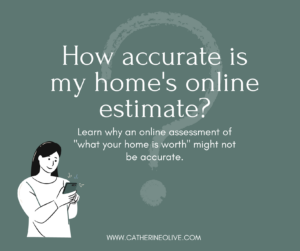Who hasn’t checked out online real estate sites for price estimates of their own home, a neighbor’s home, or even a beach house when on vacation? Most of us are guilty as charged!

It’s easy to see why these sites and apps are tempting to use since buyers and sellers can get marketing information directly to their fingertips.
However, keep in mind, these estimates are not as accurate or as consistent as you may think.
That’s why you shouldn’t insist your home be priced like your favorite online estimate – you could overprice it and your home could sit too long on the market without any interested buyers OR you might see a disappointing number online that might be too low given today’s buyer demand.
Here are 5 reasons why online estimates shouldn’t be your only resource for pricing a home as a seller or when scouting homes as a buyer.
Here’s what these sites are doing:
1. Calling estimates a “starting point” when determining a home’s value. They know their estimates are not the full picture of value, but they are betting that people don’t read the fine print when it comes to their estimates. What this means for you is that to get a more accurate analysis of what your home is really worth, a licensed professional, like a Realtor or an appraiser needs to actually see the inside of your home. Why is that important? Because every home has different factors that help inform value, things like where exactly it sits in the neighborhood to what upgrades have been done or haven’t been done compared to the most recent sales. In the San Diego County, buyer demand often also commands prices, more so than the most recent sales would suggest. You need someone who knows what’s going on behind the scenes to bring the demand factor to the pricing table as well.
2. Relying on data and information and not their own assessment of a home. These estimates are calculated by using public and any user-submitted data or corrections. They don’t conduct a physical inspection of a home, so if there are any inaccuracies in the public information, it can’t be corrected on the spot. Square footage from the tax records, for example, are notoriously incorrect and that is a huge factor in an online assessment of your home. Especially if you’ve added any square footage to your home that is not reflected in the tax records, your online estimate will be incorrect.
3. Lacking direct knowledge about the local market or your particular neighborhood. Certain neighborhoods can be really hot and in demand, but just a few blocks over in another neighborhood, prices start to drop. An online estimate can’t differentiate neighborhoods as much as you’d expect. They use data from an area much larger than your neighborhood. Many times they use sales data from an entire county to extrapolate changes in the housing market.
Plus, their systems don’t take into consideration the condition of other homes on the street, if there is a feature your home has that others don’t, or even if the home is on a busy road. That’s why it’s best to have a professional physically go to your home, look around and put together a market analysis showing you how your home compares to other homes.
4. Determining calculations based on a computer system not a person. Computers are helpful for so many things, but they lack the ability to pick up the nuisances that really change the value of a home, which is why when it comes to accurate pricing, human insight wins over the data-cruncher. Online calculations are based on an algorithm that can only use quantifiable data and not anything subjective – like the quality or the appeal of a home. It can’t “systematically gather and verify” certain information, such as a lovely flat backyard that’s great for entertaining, new granite countertops in an open concept living space, or if that master suite bedroom addition really rocks.
It only knows the number of bathrooms or bedrooms and nothing descriptive about them. Sure, you want to know how many bedrooms a home has, but what about how roomy they are, the size of the closets, and the amount of light from windows? You know what’s special about your home but not a computer.
5. Showing uncertainty by providing a Value Range consisting of a high estimate to a low estimate. For example, if the estimate is $1,500,000, it could have a Value Range of $1,400,000 – $1,600,000. For another $1,500,000 home, the Value Range could be $1,475,000 – $1,575,000. See how the second range is less wide and closer to the estimate?
The wider the range indicates that less data is available for their final calculation. A smaller range between the prices means there was more information to come up with the estimated value. So keep that in mind when looking at estimates and realizing that there might not be enough information for a more accurate estimate.
As you can see, it can be “fun” to check out online estimate sites if you’re curious, but don’t depend on them when the time comes to price your home. If you want to know what your home is worth, even if you aren’t selling anytime soon, call or email me and I can do a quick walk-through of your home and provide a more accurate number for you quickly and at no cost.
Hello!
I'm Catherine and I help buyers and sellers reach their real estate goals!
Read more about me.
Whether you are a buyer, seller, or investor, we are here to help you!
Contact
+1-858-333-9912
catherine@catherineolive.com
HOME BUYERS
Homes you will love
HOME OWNERS & SELLERS
VIEW THE BLOG
schedule your free consultation